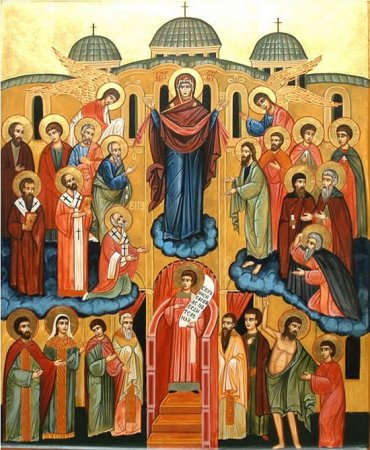 Schedule of services in our Church for November 6-8, of St. Luke the Blessed Surgeon, in the city of Pompano, Florida.
Schedule of services in our Church for November 6-8, of St. Luke the Blessed Surgeon, in the city of Pompano, Florida. O Mother of God, sheltered by Thy coming /we faithful people today keep feast in joy, /
O Mother of God, sheltered by Thy coming /we faithful people today keep feast in joy, /
and looking at Thy most pure image, /
moved to the depths of our hearts, we say: /
Protect us with Thy precious Veil /
and deliver us from every ill, /
by entreating Christ, Thy Son and our God, /
to save our souls.
(Tropar in tone 4 - Protection of the Mother of God)
 Saint Sergius of Radonezh was born in the village of Varnitsa, near Rostov, on May 3, 1314. His parents were the pious and illustrious nobles Cyril and Maria (September 28). The Lord chose him while still in his mother’s womb. In the Life of Saint Sergius it is reported that even before the birth of her son, Saint Maria and those praying heard the thrice-repeated cry of the infant at the Divine Liturgy: before the reading of the Holy Gospel, during the Cherubic hymn, and when the priest pronounced: “Holy Things are for the Holy.”
Saint Sergius of Radonezh was born in the village of Varnitsa, near Rostov, on May 3, 1314. His parents were the pious and illustrious nobles Cyril and Maria (September 28). The Lord chose him while still in his mother’s womb. In the Life of Saint Sergius it is reported that even before the birth of her son, Saint Maria and those praying heard the thrice-repeated cry of the infant at the Divine Liturgy: before the reading of the Holy Gospel, during the Cherubic hymn, and when the priest pronounced: “Holy Things are for the Holy.”
Many questions were put to our Savior during His earthly life. For the most part, they were not well intended. His enemies would try to catch Him in His words to prove that He was not divine. Instead, they fell into their own trap and find themselves silenced by His wisdom.
Not too long ago we heard one ask the Lord “Master… is it lawful to give tribute to Caesar, or not?” It was not a simple question, because many considered it wrong or sacrilegious to give to Caesar, yet if He said “No, it is not necessary.” Others would accuse Him of being a lawbreaker. His answer, “Give to Caesar what is Caesar’s and to God what is God’s.” confounded their evil intentions. It is not that Jesus was a clever debater or a brilliant logician; He was teaching divine truths, while silencing His enemies.
In today’s Gospel, we hear the story of the rich young man who comes to Christ asking Him, “Good Teacher, what shall I do to inherit eternal life?” Christ responds initially not with an answer to his question, but with a test of the young man’s faith, saying, ““Why do you call Me good? No one is good but One, that is, God.” And so, the young man’s encounter with Christ becomes a question about recognizing first, who Christ is, and second, for us, who we are and who we’re truly called to be.
In the Name of the Father and of the Son and of the Holy Spirit.
Today's Gospel from St Matthew concerns our need to forgive one another. Without forgiveness on our part, God cannot forgive us. Why?
In English the word forgive is connected with the word give. It is the same in many other languages. In French to forgive is pardonner, to give is donner. In German to forgive is vergeben, to give is geben. In other words, forgiving and giving are connected. Indeed to forgive someone is actually to give of ourselves. Not to give money or a present, but to give of ourselves. To forgive is to sacrifice part of ourselves for someone else.
 Today's Gospel Lesson is not without deep meaning. There is a mystic symbolism behind the reality of the events. In this narration I see mirrored the life of man. The sea is our short life. The boat is each one of us. The storm is the various adventures and trials of our lives, the pains and afflictions which we face every day.
Today's Gospel Lesson is not without deep meaning. There is a mystic symbolism behind the reality of the events. In this narration I see mirrored the life of man. The sea is our short life. The boat is each one of us. The storm is the various adventures and trials of our lives, the pains and afflictions which we face every day.